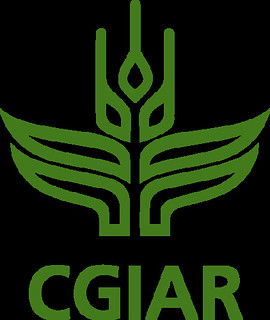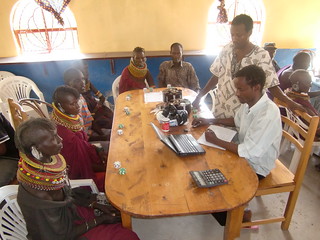The January-February issue of ‘Livestock Matter(s)’ provides a round-up of livestock development news, publications, presentations, images and upcoming events from the International Livestock Research Institute (ILRI) and its partners. Download a print version or sign up to get Livestock Matter(s) in your mailbox each month.
Corporate news
The meat we eat, the lives we lift–Opinion by ILRI director general Jimmy Smith
An opinion piece in The Economist by Jimmy Smith on the central importance of livestock to the livelihoods, health and well-being of three billion people.
 New book presents research findings on food safety in Africa’s traditional meat, milk and fish markets
New book presents research findings on food safety in Africa’s traditional meat, milk and fish markets
A new book launched on 27 January 2015 presents a review of food safety in informal markets and 25 case studies of the meat, milk and fish sectors in eight countries in East, West and southern Africa, as part of the Safe Food, Fair Food project. The book says informal markets provide essential sources of food and income for millions of poor, with milk and meat that is often safer than supermarkets.
ILRI joint appointee scientist reflects on John Dillon Fellowship experience
Hung Nguyen-Viet, an environmental scientist at the Center for Public Health and Ecosystem Research (CENPHER) of the Hanoi School of Public Health and a joint appointee of ILRI shares his experience as a John Dillon Fellow in 2014. Under the fellowship, he spent six weeks in Australia from February to March 2014 on formal training in communication, leadership development and research management, coupled with field visits to farms and research institutions.
CGIAR leads communication-for-research uptake (ResUP) training at Nairobi symposium
A CGIAR-led half-day training session on ‘key messaging and pitching for impact and influencing decision-makers to take up research’ was held on the last day of a ResUp Meet Up Symposium and Training Exchange held 9-12 February 2015 in Nairobi. The symposium explored emerging issues and advanced skills and practice in research uptake.
Setting up a joint CGIAR exhibition booth at ‘Celebrating FARA’ in South Africa
Highlights and lessons learned from participating at an event of the Forum for Agricultural Research in Africa (FARA) known as ‘Celebrating FARA’ which was held 26-28 November 2014 in Johannesburg, South Africa.
Project news
Uganda chicken project inspires bigger plan to improve Africa’s chicken breeds
A 5 February 2015 article in the Arizona State University’s Biodesign Institute website describes how success from a project that is helping Ugandan farmers improve their chickens is inspiring a new five-year project, led by ILRI, to improve chicken breeds in Ethiopia, Nigeria and Tanzania.
Case study on the first insurance for Africa’s camels, cows, sheep and goats
This case study asks students to focus on growth strategy for a specialized insurance product for the poor. It focuses on the challenges and opportunities of establishing index-based livestock insurance (IBLI) in locations with large populations of poor pastoralists.
East Coast fever consortium annual meeting – a few reflections
The 2015 annual meeting of the East Coast fever (ECF) consortium was held 9-11 February 2015 in Addis Ababa, Ethiopia. The 40 participants in the meeting reviewed progress since a 2014 inception meeting of the consortium, explored successes and challenges in the consortium’s work and revised and agreed on a new results framework.
Humanity at risk after four environment health boundaries crossed: New study
A new high-profile paper by a team of 18 international researchers, who include Jens Heinke, a joint appointee of ILRI and the Germany-based Postdam Institute for Climate Impact Research (PIK), says four planetary boundaries (climate change, loss of biosphere integrity, land-system change and altered biogeochemical cycles) have been crossed as a result of human activity, which places humanity in a danger zone.
Livestock and climate change: Workshop on successes in implementing ‘climate-smart’ livestock systems
‘Livestock and climate change’ was the topic of a recent workshop funded by the consortium of the EU Animal Change Project and organized by ILRI, the CGIAR Research Program on Climate Change, Agriculture and Food Security (CCAFS) and the Global Research Alliance (GRA) on 2-3 February 2015 at the ILRI campus in Nairobi, Kenya.
LIVES introduces new technologies to boost Ethiopia’s smallholder livestock production
The Livestock and Irrigation Value chain for Ethiopian Smallholders (LIVES) project has introduced new feeding, breeding and milk production technologies to boost smallholder livestock production in Ethiopia.
South Vietnam study shows pig production still most profitable in country’s livestock sector
Under the REVALTER project, ILRI, with other partners including French and Vietnamese research organizations, is working to improve livestock development in Vietnam, specifically in the pig value chain.
ILRI emphasizes role of smallholders in future livestock development and innovation at India agricultural conference
ILRI was one of the participants at a high-level 74th annual conference of the Indian Society of Agricultural Economics held 18-20 December 2014 in Aurangabad, India. Steve Staal, ILRI’s regional representative for East and Southeast Asia, delivered a keynote on the role smallholders play in meeting rising demand for livestock products in the country and the region.
Africa RISING Ethiopia manual for innovation platform facilitators
This manual is prepared for innovation platform facilitators in Africa RISING Ethiopia sites to help them understand the basics of facilitating innovation platforms.
• More from ILRI projects
• Subscribe to ILRI news by email
Media news
How to go about rearing pigs
In Uganda, pork is a favourite for many people and due to a high demand for it, rearing pigs is highly profitable. Good pig husbandry practices include ensuring good feeding, breeding and housing of pigs. Farmers also need to manage diseases. ILRI’s smallholder pig value chain project is helping farmers in Uganda improve pig production.
Fodder and forage solutions
LRI is collaborating with the Napier grass breeding program of EMBRAPA, the Brazilian agricultural research corporation, to develop improved lines that are disease resistant and have high nutritional value.
Tanzania: Innovation key for more milk production
Tanzania’s dairy farming stakeholders are advocating for an approach that has been tried and tested in the country to increase milk sales including approaches such as the innovation platforms used in the three-year MilkIT project that enhanced dairy-based livelihoods in India and Tanzania through feed innovation and value chain development.
Study finds pig value chain in Vietnam fair
Recently, Jo Cadilhon, senior agricultural economist, Policy, Trade and Value Chains program at ILRI, travelled to Vietnam to provide methodological support on how to calculate production costs, margins and profits in value chains as part of the REVALTER project on future prospects for livestock in the country.
CGIAR news-updates from research programs we work in
Livestock and Fish independent external evaluation kicks off this year
In 2015, the CGIAR Research Program on Livestock and Fish will be evaluated by a team commissioned by the Independent Evaluation Arrangement (IEA) office of CGIAR. You can learn more about the evaluation here.
How the Livestock and Fish program selects project sites in its focus countries
Catherine Pfeifer, a spatial analyst in ILRI’s Livestock Systems and Environment program, talks about the approaches used in the CGIAR Research Program on Livestock and Fish, which is led by ILRI, to implement improved site selection procedures for determining and focusing the program’s activities for impact.
New study proves index based insurance can work for rural poor on large scale
A new study by CCAFS and the International Center for Climate and Society (IRI) at Columbia University showcases projects such as the ILRI-led Index Based Livestock Insurance program, that have overcome many of the challenges that have previously hindered the uptake of index-based insurance such as poor infrastructure and lack of financing to reach millions of smallholder farmers.
Recent presentations
ILRI and TotoGEO: Some ‘big ideas’ and areas for potential collaboration
In this issue we feature a presentation given by Iddo Dror, head of capacity development at ILRI, at the leveraging TOTOGEO and partnerships meeting, INSEAD, Singapore, 16 February 2015.
Recent publications
- Ecohealth research in Southeast Asia: Past, present and the way forward
- African swine fever: Uganda smallholder pig value chain capacity development training manual
- Gender, assets, and market-oriented agriculture: learning from high-value crop and livestock projects in Africa and Asia
- An instructional design process to optimize use of the Feed Assessment Tool (FEAST)
- Index-Based Livestock Insurance (IBLI) lessons in extension and outreach: A case of Wajir County
- Exploring gender perceptions of resource ownership and their implications for food security among rural livestock owners in Tanzania, Ethiopia, and Nicaragua
- African chicken genetic gains: Providing well-adapted chickens for African smallholders
- Strategies for effective linkage of science, policy and practice for climate change adaptation
- ILRI’s experience with the Crop and Goat Project in Tanzania from a gender perspective
- Feed resources vis-à-vis livestock and fish productivity in a changing climate
- Responses of vegetation and soils to three grazing management regimes in a semi-arid highland mixed crop-livestock system
- A meta-analysis of the effects of communal livestock grazing on vegetation and soils in sub-Saharan Africa
- Sustainable intensification in drylands: What resilience and vulnerability can tell us
- Planetary boundaries: Guiding human development on a changing planet
- Risk factors associated with occurrence of African swine fever outbreaks in smallholder pig farms in four districts along the Uganda-Kenya border
- Ecohealth research in Southeast Asia: Past, present and the way forward
Multimedia
MilkIT: Enhancing dairy-based livelihoods in India through feed innovation
This video shares results of the MilkIT project in Uttarakhand (India). The goal of the project, which is funded by the International Fund for Agricultural Development (IFAD) is to contribute to improved dairy-derived livelihoods in India and Tanzania via intensification of smallholder production focusing on enhancement of feeds and feeding using innovation and value chain approaches.
ILRI under the lens
This issue features photos on the discussion of the ILRI’s Feed Assessment Tool (FEAST). The tool offers a systematic method to assess local feed resource availability and use. It helps in the design of intervention strategies aiming to optimize feed utilization and animal production. Find more information on this tool here.

An expert meeting to refine the TechFit tool. ILRI Addis Ababa, Ethiopia, 12-13 March 2013 (photo credit: ILRI\Zerihun Sewunet).
Upcoming events
- April 14-15: Science with Impact – BSAS Annual Conference
- May 20-22: 10th eLearning Africa Conference
- May 21-22: WVA/WMA Global Conference on One Health
- June 11: IFAH-Europe conference ‘Healthy animals, healthy food, a healthy future’
- July 12-17: World Congress on Integrated Crop-Livestock-Forest Systems
- August 24-26: International Conference on Emerging Infectious Diseases
- September 16-18: Tropentag 2015: Management of land use systems for enhanced food security: conflicts, controversies and resolutions
- October 5-10: Africa Wide Agricultural Extension Week
Staff updates
In January and February we welcomed the following staff:
- Alemayehu Tsegaye, mechanical technician, Engineering and Facilities Management
- Augustine Nthitu, animal health technician, Kapiti ranch
- Ann Mureithi, senior administrative officer, Director General’s office
- Ashenafi Kidanemariam, environmental, occupational health and safety officer, Environmental, Occupational Health and Safety unit
- Barbara Wieland, team leader for herd health, Animal Science for Sustainable Productivity (ASSP)
- Deborah Wyburn, capacity development/instructional design specialist, CapDev
- Elizabeth Kibwana, research technician, Biosciences–Vaccine Platform
- Francesca Stomeo, capacity building research, BecA-ILRI Hub
- Isabelle Baltenweck, program leader, Livelihoods, Gender and Impact (LGI
- Jason Sircely, ecologist, Livestock Systems and Environment (LSE)
- Lina Wanga, personal assistant to the deputy director general, Integrated Sciences
- Mesfin Hailu, program accountant, ASSP
- Shiferaw Tafesse, capacity development associate, CapDev
We said goodbye to:
- Eskender Berhanu, driver, ASSP-LIVES project
- Suzanne Bertrand, deputy director general
- Mark Kapchanga Kwemoi, communications specialist, Policy, Trade and Value Chains (PTVC)
- Solomon Maina, research technician, BecA-ILRI Hub
- James Mbora Wainaina, research assistant, BecA-ILRI Hub
- Mohamed Guyo Shibia, research officer, LSE
- Lucy Njeri Kirori,administrative assistant, PTVC
- Apurba Shee, agricultural economist, LSE



